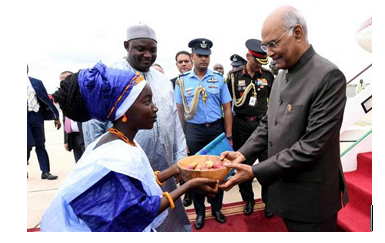Relevance : GS Paper II

Theme of the Article
There is a disconnect between India’s developmental assistance to and economic engagement with the continent.
Why has this issue cropped up?
Recently, two important Indian dignitaries began their respective visits to Africa. President Ram Nath Kovind to Benin, Gambia and Guinea-Conakry and Defence Minister Rajnath Singh to Mozambique. These visits indicate enhanced priority to Africa.
Economic links
- In in the last India-Africa Forum Summit in 2015, India agreed to provide concessional credit worth $10 billion.
- By 2017, India had cumulatively extended 152 Lines of Credit worth $8 billion to 44 African countries.
- India has also unilaterally provided free access to its market for the exports of 33 least developed African countries.
- Its trade with Africa totalled $63.3 billion in 2018-19. India was ranked the third largest trading partner of Africa having edged past the United States during the year.
- The figures for Indians’ investments (estimated at $50 billion) and Indian diaspora (approximately three million) are a bit imprecise but are also substantive when put in the continental perspective.
The issues in India-Africa relations
- Although the above statistics are impressive, they are well below the potential for India-African economic synergy and are often dwarfed by the corresponding Chinese data.
- There seems to be a conspicuous disconnect between Indian developmental assistance to and India’s economic engagement with Africa.
- From the demand to remove the statues of Mahatma Gandhi in Ghana to the travails of Indian investors in Africa, from occasional demonisation of the long-standing Indian community to the non-recognition of Indian academic degrees, India’s large developmental footprint in Africa does not produce commensurate empathy.
- India’s aid being unconditional, the recipients often take it as an entitlement.
Way forward
We need to ask ourselves these: for all the development billions spent, how many mega-projects did Indian companies get and how many natural resources does India have access to in Africa? We should reorient our developmental profile to be more economically productive. To this end, a number of steps can be considered:
- First, we need to take direct control of our development programme instead of handing our funds to intermediaries such as the African Union, the African Development Bank Group and the Techno-Economic Approach for Africa-India Movement (TEAM 9), whose priorities are often different from India’s. To make an impact, our aid should be disbursed bilaterally and aligned with national priorities of the recipient state, which should be a substantial stakeholder and co-investor in schemes and projects from initiation to operation.
- Second, India’s development assistance should prefer the countries with its substantial interests, both existing and potential. For instance, Nigeria, South Africa, Egypt, Ghana, Angola and Algeria are India’s top six trading partners in Africa, accounting for nearly two-thirds of its trade and half its exports to the continent; yet, they do not figure commensurately in India’s developmental pecking order. India’s own needs for raw materials, commodities and markets should be factored in its aid calculus.
- Third, we ought to prefer aiding countries which are willing to help us — from access to their natural resources to using our generics.
- Fourth, the aided project selected should be compatible with local requirements. They should be cost-effective, scalable, future ready and commercially replicable.
- Fifth, for greater transparency, India should prefer its public sector to implement the aid projects.
- Sixth, the Indian Head of Mission in the recipient African state must be an integral part of the aid stream including project selection, co-ordination and implementation. Apart from empowering our diplomacy, this would ensure better harmonisation between our aid and economic objectives.
- Finally, the aforementioned should not distract us from our duty to provide the needed humanitarian assistance to Africa: to be rendered promptly and with sensitivity, but without noise.
Conclusion
India is neither a rich country nor has its hands been tainted by a history of slavery, colonisation and the exploitation of Africa. In fact, it is a developing country with similar domestic challenges of poverty, infrastructure deficit and underdevelopment. India’s aid to Africa should be reciprocated by acknowledgement and quid pro quo in terms of goodwill and institutional preference.





